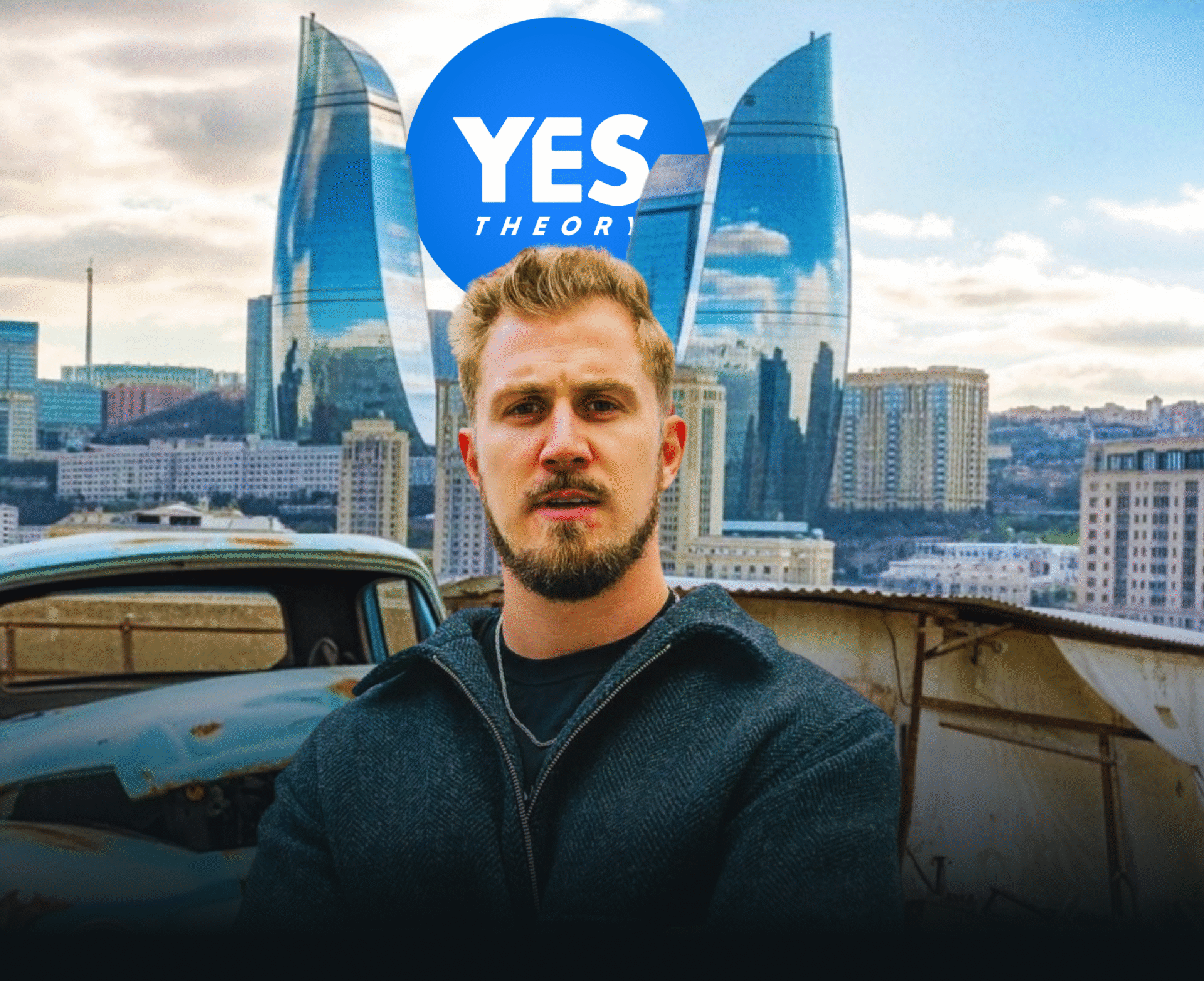Yes Theory, an influential travel YouTube channel with over 9.5 million subscribers and 1.2 billion total views, published a video on Azerbaijan where they call the country corrupt and authoritarian. Their latest video, titled “100 Hours in Europe’s Most Corrupt Country,” offers a nuanced overview of the country’s political background, its conflict with Armenia, and contrasts it with the generosity and warmth of the Azerbaijani people.
Released on July 13, 2025, the video explores the tension between the country’s repressive political realities and the humanity of its citizens. It opens with global headlines referencing war between Iran and Israel, U.S. military action, and the looming threat of broader conflict, before narrowing in on Azerbaijan — a nation caught at the crossroads of East and West, oil wealth and oppression, and past and future.
The episode labels Azerbaijan as Europe’s most corrupt country, discusses its tight surveillance culture, and references the dictatorship of Ilham Aliyev, who has ruled since inheriting the presidency from his father in 2003.
According to Freedom House, Azerbaijan is rated “Not Free” with a global freedom score of just 7 out of 100, reflecting a consolidated authoritarian regime where political power is heavily concentrated and civil liberties are severely restricted. Its internet freedom also falls into the “Not Free” category, scoring 34 out of 100, due to pervasive censorship, surveillance, and government control over digital platforms.
In 2025, the crackdown on media and researchers in Azerbaijan has intensified.
On June 20, the Baku Court of Serious Crimes sentenced seven media workers from the independent outlet Abzas Media to 7.5 to 9 years in prison on widely criticized charges, seen as retaliation for investigative reporting on President Ilham Aliyev’s family and inner circle.
Less than a month ago, the Baku Grave Crimes Court sentenced Azerbaijani researcher, peace activist, and OC Media contributor Bahruz Samadov to 15 years in prison on charges of treason. Prior to his arrest, Samadov was an outspoken advocate for peace with Armenia, often challenging nationalist narratives and calling for reconciliation.
These cases reflect the broader picture of repression in Azerbaijan: at least 25 journalists and media contributors are currently imprisoned — the highest number since Azerbaijan joined the Council of Europe in 2001. The government continues to weaponize the judiciary to silence critics, civil society, and anyone advocating for peace or justice.
This makes Yes Theory’s effort to highlight systemic issues, while also showcasing the humanity of everyday Azerbaijanis, all the more significant.
Trophy Park and the Armenian Perspective
The video also includes a brief stop in Trophy Park, a war museum in Baku unlike any other.
While Yes Theory acknowledges the park’s unsettling nature and recognizes it as a reflection of the country’s “ongoing controversies and conflicts,” the video moves on quickly. Out of respect for local restrictions and their discomfort, they choose not to film inside.
Also known as the Military Trophies Park, it was inaugurated by President Ilham Aliyev in April 2021 and showcases captured Armenian military equipment, rows of helmets taken from killed Armenian soldiers, and grotesque mannequins designed to mock Armenians.
To Armenians, Trophy Park is not merely controversial — it is a grotesque celebration of ethnic cleansing, a state-sponsored display of ethnic triumphalism that glorifies war crimes committed during the Second Artsakh (Nagorno-Karabakh) War. It functions as a psychological weapon, a public assertion of domination intended to erase Armenian identity from Artsakh and instill fear.
The park has been condemned by Human Rights Watch, Genocide Watch, and multiple international legal scholars as a violation of the Geneva Conventions, which prohibit the desecration of enemy remains and humiliating treatment of the dead.
Yes Theory’s Role and Contrast With Propaganda
Yes Theory’s focus is on storytelling rooted in human experience, rather than investigative journalism or political advocacy. In this episode, by showcasing acts of kindness within a repressive political context, the video emphasizes the distinction between individuals and the governments under which they live, illustrating that dignity, trust, and compassion can persist even in environments marked by censorship and control.
This stands in contrast to recent PR-driven portrayals of Azerbaijan.
In September 2024, content creators Nuseir Yassin (Nas Daily) and Aija Mayrock released a video portraying the country as a model of “coexistence” and “tolerance,” while ignoring its record of human rights abuses, the ethnic cleansing of Armenians, and ongoing violations of international law.


